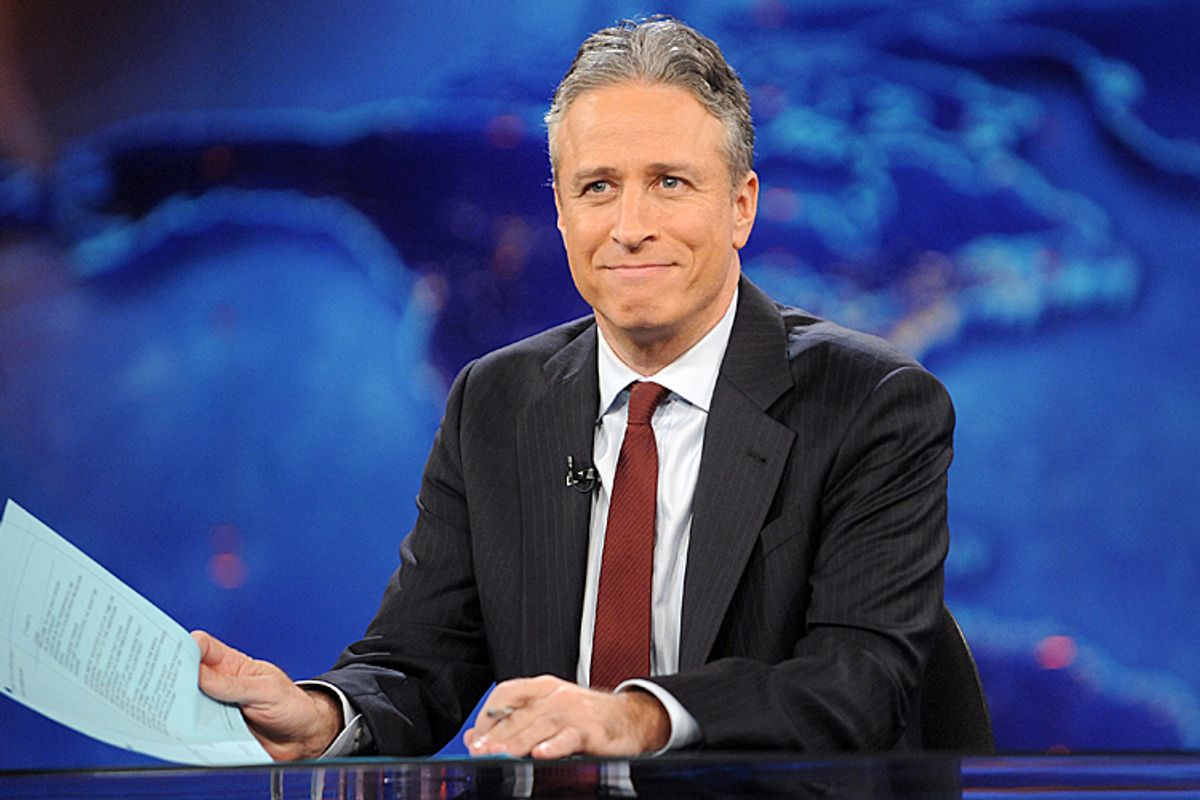Last night's Emmy Awards saw the highest concentration of upsets in recent memory: the "Modern Family" cast failed to capitalize on any of their five acting nominations, losing to less-well-known performers from "Nurse Jackie" and "Veep." "Breaking Bad" star Bryan Cranston didn't just lose the best actor in a drama trophy -- he lost to Jeff Daniels, from the much-maligned first season of "The Newsroom."
But perhaps the biggest shock of the night was something comedy watchers have been waiting for for years and by now presumed would never come. For the first time in a decade, Jon Stewart's "The Daily Show" lost the outstanding variety, musical or comedy series trophy -- and lost to his protegé, Stephen Colbert of "The Colbert Report."
The category's outdated name gives a sense of what it awards -- essentially, late-night comedy shows. Beginning with the 2003 Emmys, which honored the TV season including Stewart's "Mess O' Potamia" coverage of the beginning of the war in Iraq, "The Daily Show" had won 10 times consecutively. It's a streak unmatched in any other category; to give a sense of history, the shows that won the best comedy and drama Emmys in 2003 were "Everybody Loves Raymond" and "The West Wing." It was so long ago!
The list of shows "The Daily Show" bested includes some of the most established franchises in comedy, and Stewart's dominance over "Saturday Night Live," "The Tonight Show With Jay Leno," and "The Late Show With David Letterman" (which had won this category five times consecutively before Stewart took over) speaks to the rapid rise of Stewart a decade ago as an essential voice.
The Emmys helped legitimize Stewart and Comedy Central at precisely the right moment. Before the Emmy wins, "The Daily Show" was easy to see as a scrappy upstart; its coverage of the 2000 election had been fun and widely remarked-upon, but it was the Bush administration's military misadventures that made the show a hit. On the occasion of the show's first win (it beat "SNL," and Leno's, Letterman's and Conan O'Brien's talk shows), Stewart cracked, "It was such a great war for us. It's weird, when you have a show that deals with events. When the events get catastrophic, your show gets popular."
The events kept coming; Stewart wasn't just an Emmy favorite but a best-selling author by the time the 2004 election had wrapped up. One Emmy win can be a fluke; two can be a sign that the academy likes what you're up to. But as Stewart's decade of wins continued, it was hard not to feel, during the presentation each year, as though he were the only host, and his the only show, that mattered. Stewart's "Daily Show" beating so many late-night chatfests wasn't just noteworthy because they were on big broadcast networks and in many cases hosted by industry legends; with some exceptions ("Chappelle's Show" was nominated, and lost, in 2004), "The Daily Show" was, in the early 2000s, the only show assaying the news of an unusually turbulent period in history in a serious-minded way. Letterman's period of dominance at the Emmys had commenced as the ironic 1990s staggered to a close. It was the show of its time; Stewart's was the show of his.
Beginning in 2006, "The Colbert Report" was annually nominated alongside its fellow Comedy Central series; "Colbert" starred a popular "Daily Show" personality and, rather than taking the form of a fake news series, was a fake Fox News-style opinion show. Stewart's persona was one of an earnest truth-seeker; Colbert's was of a wildly over-the-top conservative pundit. The show's nominations wouldn't have been possible without Stewart's having primed people to take Comedy Central seriously. And "The Colbert Report," it became clear, would beat "The Daily Show" one day; not merely did Colbert follow a trajectory similar to Stewart's (fitting the mood of the time in just the right way, Colbert published a best-selling book and got magazine profiles, too) but the show beat "The Daily Show" for the best writing trophy in the election years 2008 and 2010.
"We were told we'd get a free sandwich after 10," said Stewart at the Emmys when the show won its 10th trophy. "No more. No más." He then specifically credited Colbert's "super PAC" leitmotif, in which Colbert raised awareness of super PACs' practices, post-Citizens United, by starting his own. Stewart got his wish; with the voters getting their Emmy ballots just as Stewart went on hiatus, enough voters gravitated to Colbert's phony conservative loudmouth to break the streak.
It will take several more Emmy ceremonies to know if this win was a fluke occasioned by Stewart's time off or the coronation of a new late-night king. But the matters on which Stewart made his name -- the Iraq War, the Bush administration's endless crises -- are no longer with us; he's done great work on the Obama years, but it's not as though there's as consistently fertile ground for comedy. Obama's years may not have been a time of peace and prosperity, but they've been more marked by right-wing outrage than by incompetence.
Colbert is far better-equipped to satirize that outrage -- it's the entire purpose of his show. Colbert referred to himself, at last night's ceremony, as "that stupid person I play on TV," and that felt right. Perhaps after a decade that took us from Republicans orchestrating a catastrophic war to Republicans in shrill retreat, the pendulum's swung away from (relative) earnestness and toward irony as the defining mode.

Shares